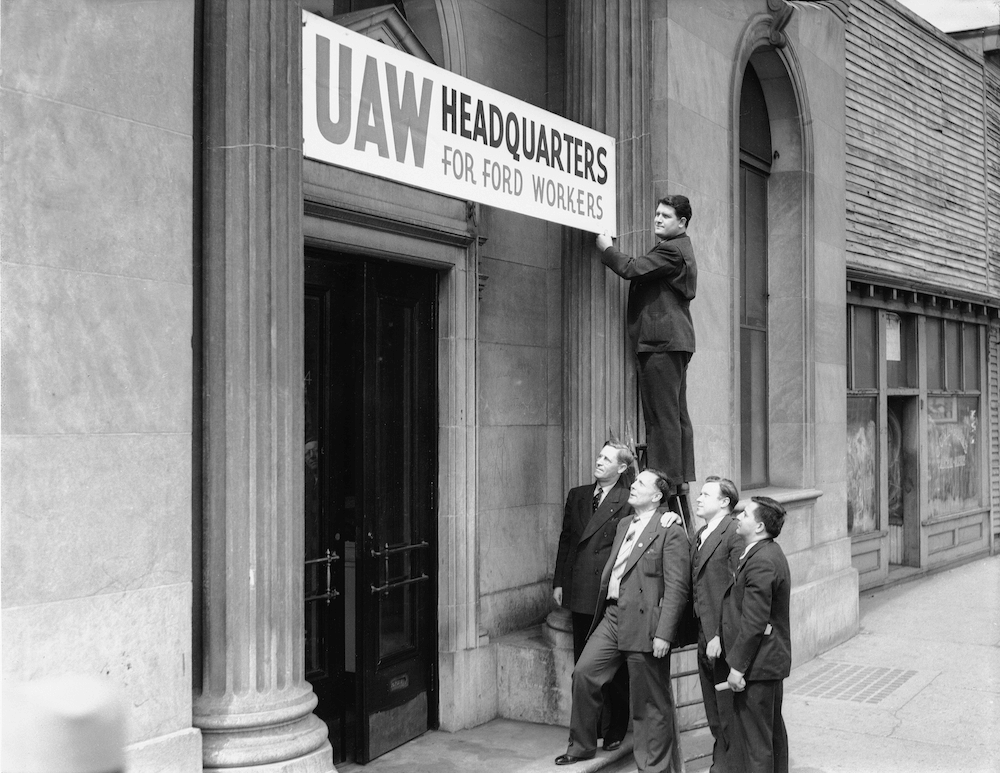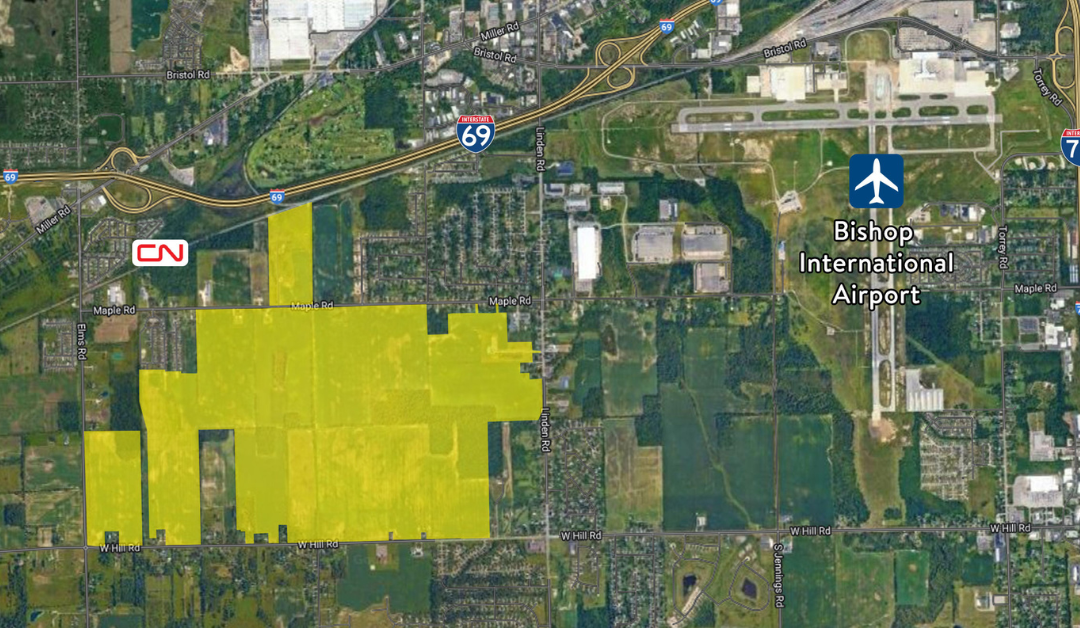
Richard Frankensteen, on ladder, director of the United Auto Workers' campaign to organize Ford Motor Company employees, puts the final touches on the sign designating this bank building in Detroit, Mich., as headquarters for the drive, May 26, 1937. Others, from left to right are: J.J. Kennedy, office manager; Walter Wells, international vice president; Walter Reuther, West Side local president; and Morris Field, organizer. (AP Photo)
New laws could help Michigan workers financially, and restore the middle-class ticket, pro-labor voices say.
LANSING—For hundreds of thousands of Michiganders who grew up in middle-class union families, seeing a rebirth in the labor movement is what organization is all about. That’s according to Tom Burke, a union stagehand in West Michigan.
“Unions give dignity and respect to workers when they band together and give them a voice on the job,” Burke said.
When the modern labor movement began, Michigan workers banded together to fight for paid sick and vacation time, overtime pay, and higher wages. Today, the same work continues—with larger battles once again to be waged against economic inequality, unsafe working conditions, and corporate greed. And here in Michigan, they’ve just won the battle against “right-to-work” laws.
What’s a “Right to Work” law?
Right-to-work sounds like a square deal, but it actually benefits corporations—not workers. “Right-to-work” is the name given to any policy that claims to give people the “right” to work without being forced to join a union. But the reality is that a federal law known as the Beck Right already makes it illegal to force people to join unions.
“Even the term ‘right-to-work’ seems like most people would get behind that,” said Ivan Diaz, an organizer of a successful unionization at Lake Michigan Credit Union. “But then when you actually go into the details of what it is and what it does, clearly a majority of Michiganders don’t support that.”
Right-to-work laws in fact make it harder for workers to collectively bargain with their employers for better wages and benefits. In 2013, Michigan’s Republican Governor Rick Snyder—along with a Republican-majority state Legislature—passed a right-to-work law, called “Freedom to Work.” It was a name consistent with Republican doublespeak at the time, organizers say—sowing disinformation about unions in an attempt to protect corporations. One argument for Freedom to Work, for example, was that it would help stop union support for politicians.
“It’s a nice line, but it’s full of lies,” said Burke, the union stagehand. “For one, union dues can’t be used to fund politicians. Union dues can be used to defend the contracts and represent workers.”
Back in 2013, Democrat Gretchen Whitmer—then Michigan’s Senate minority leader—led the fight against right-to-work laws. Since then, it’s been a long decade for organized labor here in Michigan. Union membership declined by tens of thousands of jobs.
After right-to-work took hold, a “free rider” cycle worsened in the state. Without momentum for unions, people stopped joining them—and therefore many employees began enjoying the benefits of union membership without paying dues or bargaining fees, which in turn stressed the abilities of unions to help workers. With a decades-long trend of declining union membership in full swing, Michiganders began to learn first-hand what a 2021 study by the Economic Policy Institute found: Wages for all workers are higher when there’s a greater share of workers who are members of unions.
Then, Michigan’s union membership started ticking up. Even as union membership declined nationally, Michigan gained 50,000 new union members in 2022. For every 100 jobs added in the state, roughly 29 were unionized.
Michigan also saw some highly publicized union certifications happen at local branches of Chipotle, Starbucks, and credit unions—workplaces not commonly associated with unions—in addition to increased union activity in education, construction, and jobs considered to be essential during the COVID-19 pandemic. Union support, in fact, is now at its highest point since the 1960s.
Will they or won’t they?
In November, Democrats were voted into state power in record numbers. Michigan’s Legislature turned blue for the first time in 40 years, and with Whitmer taking her second term as governor, many became hopeful that right-to-work would go right-on-out.
Indeed, right-to-work repeals were introduced at the very beginning of the new Legislative session, but didn’t move out of committee as quickly. Some union supporters began to get nervous.

In Detroit, members of the Teamsters Union raised billboards reminding elected leaders to “keep your promise.”

Back in the Senate chambers, the right-to-work repeal moved from committee to floor. And as the final vote was tallied, hundreds of crowd members sprung up in applause.

On March 24, 2023, Gov. Whitmer officially signed the package repealing the “Freedom to Work” law, making Michigan the first state in 58 years to take right-to-work off its books.
“I think that making sure that we’ve got a robust economic environment that also gives workers paths to good pay is important and can be done,” Whitmer told The ‘Gander in February. “And that’s what we’re going to work toward.”
Whitmer additionally signed legislation that restores prevailing wage, a guarantee of union-standard wages for government construction projects. Michigan’s prevailing wage law was previously in place since 1965, until Republicans repealed it in 2018.
Sen. Darrin Camilleri (D-Trenton), who sponsored the Senate bill, said the package wasn’t just about repealing right-to-work.
“I’m the proud son and grandson of UAW auto workers, and I know that the strength of unions in our state is one of the reasons why I live the life that I do today,” he said.
Politics

Mundy Twp. project gets state funding in effort to boost local manufacturing
More than $9 million awarded to a planned development project in Genesee County could provide a big boost to the local economy and help create...

It’s official: Your boss has to give you time off to recover from childbirth or get an abortion
Originally published by The 19th In what could be a groundbreaking shift in American workplaces, most employees across the country will now have...

Michigan Dems win special elections to regain full control of state government
LANSING—Democrats won back a majority in the Michigan House and restored their party's full control of state government Tuesday thanks to victories...
Local News

That one time in Michigan: When we became the Wolverine State
How did Michigan become tied to an animal that's practically nonexistent there? Among the many nicknames that the state of Michigan has, arguably...

Readers’ Choice: Top 5 Bowling Spots in Michigan
From retro lanes — including one of the oldest running bowling alleys in the country — to modern entertainment centers, there's something for...





